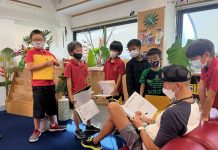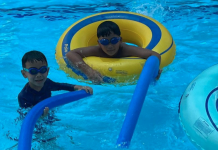Welcome back! We hope your vacations were restful and full of time to connect with loved ones.
First, Thank you so much for the holiday gifts. It was so kind and generous of each of you and we spent our vacations munching and enjoying the thoughtful items. We feel fortunate to have so much support from our parent community this year and it’s been a pleasure working with your children each day. We both stayed in Thailand for the break and enjoyed spending time with our families while exploring exciting places.
Air Pollution
School-wide Announcement made via email on January 7th.
We normally let students into our classroom at 7:35 and we start class at 7:45. However, if ISB’s AQI monitor indicates an AQI level at or over 151, students are welcome to come into our classroom if they arrive to school early. If levels are below 151, students can play at the big toy or can go into the HUB as usual. AQI levels in our classroom have been <AQI 10 since the filtration system was installed over October Break. We are glad that ISB has invested in high quality air filtration systems across the campus! Bookmark this website if you’d like to know accurate and up to date AQI levels at ISB: ISB’s AQI monitor
What will we be learning in the coming months?
Reading – Focus on Fluency
Fluency is the ability to read a text accurately, at an appropriate and with expression reflective of the meaning. Key fluency skills are intonation, pacing, and phrasing. Fluency is directly related to comprehension!
“Ideally, children would be reading with a high level of accuracy (97+percent accuracy) and at least a fair level of fluency. Such are the typical characteristics of readers reading appropriate books that allow children and adolescents to develop and polish useful reading strategies.” (Richard L Allington).
The goal of this unit is to get students focused on reading as much as possible (volume) of “just right” books at an appropriate reading rate with comprehension (fluency) in order to grow as readers. ” All these studies have consistently shown regardless of how volume of reading was measured, that there exists a potent relationship between volume of reading and reading achievement. Recent data . . . suggests that dramatic increases in reading volume is critically important in developing thoughtful literacy proficiencies.” (Allington).

Writing – Science Writing
Our time in writing will be connected to the scientific process, simple experiments and lab reports. We will start off by introducing the vocabulary and thinking routines that scientists use. This unit often engages our reluctant writers and gives students a lot of choice and control around what they write about each day.

Math – Foundations of Multiplication and Division
Here are the skills students will be learning and practicing.
Week 1-
- Create equal groups of objects.
- Use drawings and tape diagrams to represent the groups
- Relate equal groups to repeated addition.
Week 2 –
- Compose and decompose arrays with drawings or manipulatives.
- Relate arrays to repeated addition.
- Solve addition word problems using rows and columns
Week 3 –
- Use tiles and math drawings to compose/decompose a rectangle without gaps or overlaps.
- Relate drawings to repeated addition.
Week 4 –
- Understands that doubles are even numbers
- Relates doubles to number sentences.
- Pairs objects to skip count
- Determine whether a group has odd or even numbers by pairing the objects or skip counting.
Science – Solids and Liquids
We will explore the properties of solids and liquids and also explore different states of matter. Students will interact “with physical science core ideas dealing with matter and its interactions and engineering design. The experiences help students develop an understanding about how materials are similar and different from one another and how the properties of materials relate to their use.” FOSS





